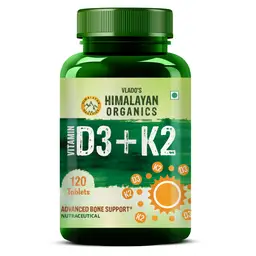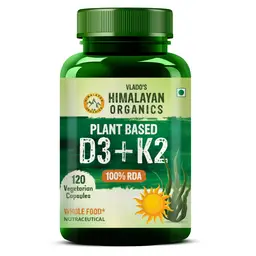Signs & Symptoms Of Vitamin D Deficiency In India

Signs & Symptoms Of Vitamin D Deficiency In India
Posted on 20th May, 2023
Despite the country's ample sunlight, Vitamin D deficiency is a common lifestyle problem, widely spread all over the world, including in India.
In spite of so many sources available for vitamin D, individuals are not getting in enough quantity, leading to various health issues.
This deficiency can affect people of all ages, genders, and races, making it crucial to be aware of its signs and symptoms.
In order to combat this deficiency effectively, it is essential to understand its role in our bodies and take preventive measures.
Our aim in this article is to provide you with information on the signs and symptoms that may indicate vitamin D deficiency, so you can take preventive measures and begin treatment as soon as possible.
What is the role of Vitamin D in our body?
Vitamin D is crucial to maintaining overall health and well-being. It’s main function is to regulate the absorption of calcium and phosphorus, which are essential for strong bones and teeth.
Without enough vitamin D, your body will not be able to absorb calcium from the sources, which will make your bones weak and brittle.
Additionally, vitamin D supports immune function, assists in muscle function, and promotes proper cell growth. It also plays a role in reducing inflammation and improving mental health.
The common symptoms are:
Tiredness & Fatigue: If you are feeling constantly tired and fatigued, even after sufficient rest, it can be a sign of vitamin D deficiency.
Osteomalacia & Osteoporosis in Adults: Vitamin D is necessary for proper bone mineralization. Insufficient levels of vitamin D can lead to weakened bones, increasing the risk of osteomalacia (softening of bones) and osteoporosis (loss of bone density).
Rickets: In children, vitamin D deficiency can cause rickets, a condition characterized by soft and weak bones, delayed growth, and skeletal deformities.
Bone pain: Chronic bone pain, especially in the back, hips, and legs, can indicate low vitamin D levels.
Parkinson’s disease: Studies suggest that individuals with lower vitamin D levels may have a higher risk of developing Parkinson's disease or experiencing worsening symptoms.
Hair loss: Vitamin D plays a role in maintaining healthy hair follicles, and deficiency may contribute to hair loss or thinning.
Low immunity: Vitamin D supports immune function, and inadequate levels can lead to a weakened immune system, making individuals more susceptible to infections and illnesses.
Muscle pain & cramps: Deficiency in vitamin D may cause muscle weakness, pain, and cramps. In recent studies, most people suffering from muscular pain were found to be deficient in vitamin D.
Slow healing of the injury: Vitamin D plays a crucial role in the healing process of wounds and injuries. Inadequate levels can result in delayed healing.
Depression, irritability & mood changes: Vitamin D deficiency has been associated with an increased risk of depression, mood swings, irritability, and cognitive impairment.
Cramps & Fractures in extreme conditions: In severe cases of vitamin D deficiency, individuals may experience muscle spasms, severe cramps, and an increased risk of fractures due to weakened bones.
Insufficient or poor nutrient absorption: Vitamin D is essential for the proper absorption of nutrients like calcium and phosphorus. Deficiency can lead to suboptimal absorption, affecting overall nutrient balance.
How to prevent Vitamin D deficiency?
One can prevent vitamin D deficiency and maintain adequate levels, by following below measures:
Eat foods rich in vitamin D: Include foods naturally high in vitamin D in your diet, such as fatty fish (salmon, mackerel, sardines), fortified dairy products, eggs, and mushrooms. Incorporating these foods regularly can help increase your vitamin D intake.
Get Sufficient Sun Exposure: Sunlight is the primary source of vitamin D. Spend time outdoors and expose your skin to sunlight, preferably between 10 am and 3 pm when the sun's rays are the strongest. However, remember to take precautions to avoid excessive sun exposure and protect your skin from harmful UV radiation.
Consider Vitamin D Supplements: Sometimes we can’t fulfill daily allowance of vitamin D alone through our diets, and due to current situation of WFH has made it even impossible.
In this situation, taking vitamin D supplements is your best shot, Vitamin D supplements are available in many forms, including capsules, pills, and liquids.
Regular Health Check-ups: Include vitamin D level testing in your routine health check-ups. This can help identify any deficiencies early on and allow for prompt intervention and treatment.
Conclusion
Vitamin D deficiency is a growing concern in India, despite the abundance of sunlight. Recognizing the signs and symptoms of deficiency is crucial for timely intervention and prevention of associated health issues.
Maintaining optimal vitamin D levels through a combination of sunlight exposure, a diet rich in vitamin D, and, if necessary, supplementation can help combat this deficiency and support overall health and well-being.
Remember to consult with your healthcare provider for personalized advice and guidance regarding vitamin D supplementation and managing your vitamin D levels.

Health articles from our experts

Signs & Symptoms Of Vitamin D Deficiency In India

Signs & Symptoms Of Calcium Deficiency

10 Sources Of Vitamin D For Vegetarians

Top 10 Benefits of Ashwagandha Leaves

Top 5 Vitamin D Fruits and Vegetables You Should Know

Neurological symptoms of Vitamin D deficiency

10 Fruits rich in Vitamin K

Benefits of Ashwagandha for Men

Signs and Symptoms of a Chromium deficiency






